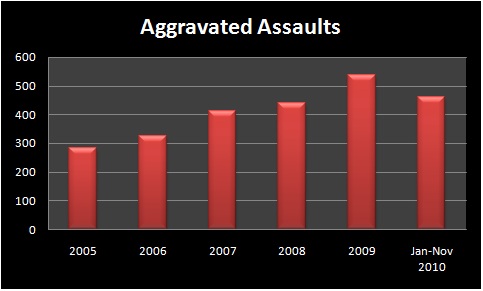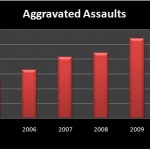Former Councilman Blames $alaries, $piking for Crisis
Hernandez: 113 employees making $100,000+, pension spiking to $300,000
City Manager denies pension spiking taking place
By Dave Roberts
Tuesday night, in the first Antioch City Council meeting after what may have been the bloodiest December in city history, residents blasted the council for allowing the police force to decline, including the possible layoff of six officers, while crime escalates in the city.
Former Councilman Ralph Hernandez asked city officials to join in an investigation of how the city got to the point of having to potentially lay off police officers or face the possibility of bankruptcy. He places the blame on excessive salaries and benefits for city employees.
“One of the things that we found, of which the public should be aware, of why we are in such financial dire straits: in 2009 there were 113 employees that made over $100,000 in pay,” said Hernandez. “We had a couple of employees that were set to retire. And because of the questionable contracts that the City Council had approved, you had one employee that made $298,000, which is almost twice his yearly salary. Another employee, a police lieutenant, made $225,000. He spiked his retirement. Of the 113 who made over $100,000 in pay, 93 of those were officers of our (police) department. We are not blaming the officers. It is the decision makers that allowed it to happen.”
Hernandez suggested there could have been tradeoffs between council members and union officials: generous compensation packages in exchange for electoral support. “We are going to ask several bodies to conduct a thorough and complete investigation as to what happened,” he said. “It is not the citizens’ fault for the financial mess that we are in. It’s not the employees’ fault, although the employees have benefited greatly. It’s the ultimate decision makers and some of the staff that have allowed this to happen.
“So, we need answers. It’s a lot like Bell, California. The decision makers allowed that to happen. People were spiking their retirement pays and other things. We ask you to join us. The population of Antioch deserves those answers. We are not picking on employees. They have made a tremendous amount of money. That is one of the reasons why we are in the problem that we are. Ultimately, what we want to know is this: How much total is the City of Antioch paying out total toward retirement? That includes the city’s share and the employees’ share. That will probably give you some answers.”
The council members did not respond to Hernandez’s comments. City Manager Jim Jakel, via e-mail, denied that pension spiking has taken place in Antioch: “I spoke to Ralph at the meeting. No pension spiking occurred. The two employees (both with I think 25 years or more and senior positions) he mentioned retired and had payments of accrued benefits and leave under existing contracts – most of it is non PERS (Public Employees Retirement System), which means it has no impact on pension. No one who has worked for Antioch has ever had a pension of $296,000 a year, nor is it likely any time in the next several decades if ever.
“I know little about Bell, but have heard his (city manager) pay was $800,000 and a similar size pension. My pay in 2009 was $218,000 and likely will be less on my 2010 W-2. My pay is below the mid-point for City Managers in Contra Costa. I haven’t got an official pension estimate, but with total public service today of about 22 years between Martinez and Antioch, I think my pension would be more like $125,000 – but that is just a ballpark number.”
Jakel could not confirm Hernandez’s finding of 113 city employees (out of 275 currently) earning $100,000 or more in 2009. But he said that five of the top 15 earners in recent years have retired.
Jakel declined to respond to Hernandez’s call for an investigation, saying via e-mail, “The Council will be getting an update on the budget on Feb. 8 as previously scheduled. No mystery as why to we are running out of money. Revenues have dropped from $47 million to slightly more than $34 million in a 4-year period. So we have by attrition or layoffs reduced staff by more that 30% and used the fund balance to maintain operations at very basic levels.
“The retirement data is all on our website in the CAFR, but in short, PERS payment for retirement from that document is $4,928,575 for fiscal year 2010. Unfunded liability as calculated by PERS totals about $40,500,000.”
Several other residents voiced concern about the city’s downhill slide, including Thomas Riley Spainhower, who was being honored for having helped capture two house burglars. The fourth-generation lifelong Antioch resident and former Antioch Police Explorer was appalled when he returned to the city after spending five years in the military.
“Upon my return to Antioch in 2006 I found a decaying skeleton of what Antioch used to be,” Spainhower told the council. “The only comfort of staying in my home is that the police department was still staffed with many of the amazing officers that I knew before. Since I have been here we have seen the depletion of the Antioch Police Department, from CSOs (Community Service Officers) to Animal Control to now the one lifeline we as citizens have: the sworn officers. I personally have been affected by crime four times: three burglaries in my vehicle, one time trespassing with an intent to burglarize my home. With an obvious decrease in reaction time from the police, I blame not these officers that have dedicated their life to protecting us.
“But I blame partially this council. Not only for what I see as poor decisions and layoffs and obvious disregard for what I have heard many people say in this very room: the poor business decisions that have put us in this financial situation. Turning away business has hurt our financial situation. Things have got to change. I would like to thank whoever had the idea to build a giant water drop in the Water Park. Because it’s now known as a tear drop for Antioch – something our citizens can relate to.”
Also concerned is Donna Wilson, a former member of the Antioch Crime Prevention Commission. “Welcome to Antioch,” she said. “Some of you may know us as Gateway To The Delta or, depending on who you ask, we are The 91st Most Dangerous City To Live In. In my opinion, what I have seen our community go to for the last few years is it’s pretty much The Gateway To The Ghetto. We live in a society and a community that is quickly deteriorating. It pains me to drive down our streets and see the things we see and not be able to do anything about it.
“And I’m so tired of hearing the restrictions. There is a way. We need to make a way out of no way. Bring back code enforcement, bring back revenue, encourage businesses. What we have been doing isn’t working. We are being led down a path that is destructive and absolutely horrible. Everyone’s safety is at risk. The volunteerism in our community is huge. Forget what clearances there need to be. Anybody can answer a phone. Hire part-time, pay no benefits, go through a temp agency. Hire a volunteer for a few hours to man a phone. Let’s try to work together. Come up with some positive solutions. Bring back the Quality of Life Forums. It allows the public to come together for a few hours and understand what is going on. Lead us where we need to go, and let’s make a way out of no way.”
Wilson received large applause from residents, some of them holding up “Take Back Antioch” signs, which is the name of a Facebook group that Wilson said had signed up 1,000 people in three weeks.
Police Captain Allan Cantando, who is now the acting police chief following Chief Jim Hyde’s recent retirement, provided some good but mostly bad news in his report to the council. The good news is that violent crime – with the notable exception of homicides – was actually down slightly in the first 11 months of 2010 in comparison with 2009. Rape, robbery and aggravated assault were all down. The other good news is that all but three of the 15 homicides in 2010 have been cleared, meaning that the suspect has been identified or arrested.
The bad news is that there were 15 homicides in 2010, which is likely a city record and which represents a tripling over 2009. In addition, the increase in property crime – particularly burglaries and auto thefts – was greater than the decline in violent crime, leading to an overall increase.
The reduction in the police force through attrition, injuries and layoffs contributed to a 21 percent reduction in arrests in 2010. “That’s because we are in a reactive mode and not a proactive mode,” said Cantando. “That’s us getting to the scene in a timely manner, setting up a perimeter and making an arrest.”
Fewer officers per shift has also resulted in a half-minute increase in the wait time for an officer to arrive after you dial 911. In 2009 it took on average 7 minutes, 25 seconds for an officer to arrive. Last year the wait increased to nearly 8 minutes – “which is a long time if you’re waiting.” said Cantando. “That’s the average, some are faster, some are slower.”
And although violent crime dropped in the first 11 months of last year, for the four years before that it was on a steady increase. For example, aggravated assaults rose 90 percent from 2005 to 2009.
Cantando praised the job his officers have done, particularly given the limited resources. If the six officers who were handed pink slips in December are actually laid off (union concessions and private donations could avoid the layoffs), the force would be down to 98 officers, which represents less than one officer per 1,000 residents (.95). In comparison, Richmond, which is similar in size to Antioch, has a 1.88 officer/1000 residents ratio – nearly twice as many officers – and Concord’s ratio is 1.26.
“Richmond is 1,000 more population than us and they had 22 homcides and we had 15,” said Cantando. “If we had 90 more officers we could make an impact there too. But I realize there are budget concerns. But even without those officers it’s evident the officers we have in this police department are doing great work.”
But they can only do so much and be in so many places at one time. As a result, officers may not respond to some non-emergency calls in order to free them up to respond more quickly to violent crimes, said Cantando. Some residents will instead receive a form in the mail to file a police report (council members asked Cantando to look into moving reporting online). The police will also be cutting back on investigation of some crimes because some of the investigators will instead be out patrolling the streets. In addition, the police Narcotics Bureau has been closed.
But other programs will continue, including the Police Athletic League, which Cantando has headed up, reaching out to minority and faith-based organizations, coordinating with other East County law enforcement agencies, continuing the Coffee with the Cops program (although it will change to quarterly instead of monthly), expanding the Neighborhood Watch program and finding ways to increase citizen involvement in the Volunteers in Police Services program.
Councilman Brian Kalinowski responded to the criticism of the potential police layoffs (which he believes will be avoided), saying, “What this council has tried to avoid is bankruptcy. Because what happens in bankruptcy is you have some judge in San Francisco, who has probably never been to Antioch, California, making a decision about how the city is going to conduct its business. So like they did in Vallejo where they had 140ish sworn officers, the judge says that number is now 92. So what we are trying to do at the local level is avoid this looming bankruptcy issue that we have. I’m confident that we will have an agreement that doesn’t create a situation where there are layoffs or any additional layoffs. In the police department, the six positions (threatened with layoff) for the time being have been held off. With that agreement we can move forward.”
The council met in closed sesssion before and after the meeting with several of the city’s employee unions in an ongoing effort to get agreements to continue postponing promised pay and benefits hikes. The council has authorized $1.4 million in cuts in recent meetings, with the prospect of millions more needing to be cut in the fiscal year beginning in July in order to avoid bankruptcy.
In other action, the council gave the OK to seek the annexation of the Wilbur Avenue area from the county. City officials believe the annexation could be a financial boon to the city treasury from the taxes on the busineses and industrial properties, including several power plants, along the river. For that reason, county officials apparently are playing hard to get.
the attachments to this post:
Crime Map 11-10
Crime Map 11-10




























